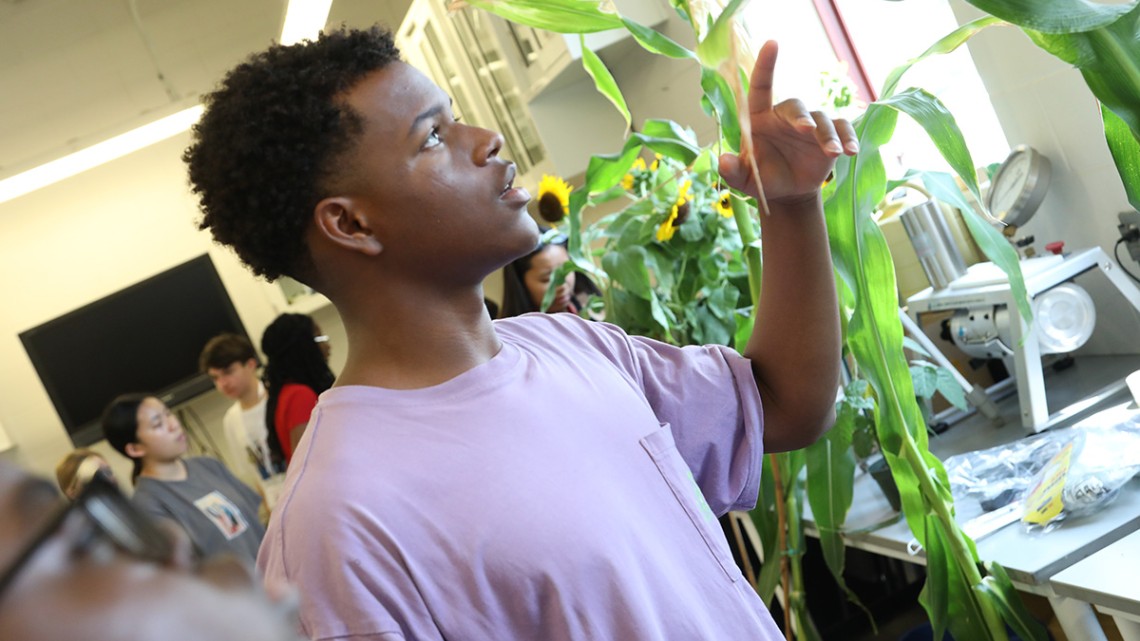
News directly from Cornell's colleges and centers
High school students explore the language of plants
By Krisy Gashler
High school students taking part in this summer’s CATALYST Academy engineering program at Cornell found themselves engaged on a topic they may not have initially connected with engineering: plants, and the complex systems that help them grow, respond and thrive.
For the past 20 years, CATALYST Academy has been bringing cohorts of high school students to Cornell’s campus to spark their interest in engineering and other STEM fields. This year, from July 16-22, CATALYST collaborated with the Center for Research on Programmable Plant Systems (CROPPS) to present a curriculum focused on the science and technology of “programmable plants” to 54 students from across the country – the largest cohort ever.
Through classroom, lab and field activities, students engaged in active learning experiences in biotechnology, plant biology, chemical and material engineering, electrical engineering, computer science and public communication. The students learned about CROPPS’ efforts to discover and invent new pathways to support agriculture and sustainability, and saw firsthand how engineering and technology play major roles in plant science and agriculture.
“The curriculum that CROPPS presented brought together this extremely robust, amazing group of cross-disciplinary experts who led students through the stages of the process they’re using to ‘talk’ to plants,” said Chris Casler-Gonçalves, assistant director for Diversity Programs in Engineering. “This is an emerging field and the social and ethical implications of this haven’t been fully explored, so it’s an exciting time to delve into the topic. It engages 16-year-olds to think really deeply on a very complex subject.”
CROPPS, a National Science Foundation Science and Technology Center led by Cornell, draws faculty and researchers from across campus – Cornell Engineering, the College of Agriculture and Life Sciences, and the Cornell Ann S. Bowers College of Computing and Information Science – along with researchers from the Boyce Thompson Institute, the University of Arizona and the University of Illinois Urbana-Champaign.
“CROPPS has had a wonderful experience collaborating with Diversity Programs in Engineering on the CATALYST program in 2023 and the CURIE program in 2022. These programs welcome students who are exceptionally curious, energetic, and engaged,” said Abe Stroock, CROPPS director, co-lead of the CATALYST research experience in 2023, and the Gordon L. Dibble ’50 Professor in Cornell Engineering. “These students are eager learners and innovative thinkers. Their final projects and presentations have given us new ways to think about the synthesis of engineering and plant science to make advances on pressing challenges in agriculture.”
Leo Herrera ’24 attended CATALYST as a high school student and has now worked as a CATALYST program assistant three times.
“CATALYST is the reason I came to Cornell, the main reason,” Herrera said. “It was the first time I had been around people of color interested in engineering, like 50 at once, so it was a pretty cool experience.”
In previous years, the CATALYST curriculum focused on strictly on engineering, while this year’s CROPPS curriculum was much more multidisciplinary, Herrera said. At the beginning of the program, some students were hesitant about the biology component, he said.
“It definitely took them a day to realize how intertwined engineering could be with plant science and biology, but once they actually got some hands-on experience with the materials and the experiments, they realized it was still the problem-solving that we love, it’s still hardware and software, it was basically biological engineering,” Herrera said.
During the first four days of the program, students learned biological and engineering concepts and applied them to experiments. They dissected plants, used software to design DNA that could create fluorescent cells and used sensors to measure soil moisture, among other activities. On the fifth day, students learned principles of science communication and developed presentations for a public audience. The range of presentations from the students – from how to filter water on the International Space Station using plants, to methods to make plants change color when they get sick – showcased the diversity of engineering principles at work in agricultural systems.
"CATALYST is a seed,” said Sijin Li, CROPPS senior personnel, co-lead of the CATALYST research experience in 2023, and assistant professor of chemical and biomolecular engineering. “We provided the students with a comprehensive picture of the interface of biology and engineering that could be rare to find in other similar programs. The cross-disciplinary experience also demonstrated the vision and core values of Cornell University to the students, such as the collaborative and innovative culture and our continuous exploration across technical boundaries.”
Krisy Gashler is a freelance writer for the Center for Research on Programmable Plant Systems.
Media Contact
Get Cornell news delivered right to your inbox.
Subscribe
